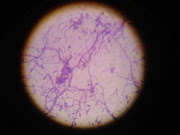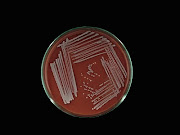BIO-15
STUDY
OF SURVIVABILITY AND EFFICIENCY OF BACILLUS
THURINGIENSIS IN WASTE WATER FOR
BIOLOGICAL CONTROL OF MOSQUITO BREEDING
(Abstract
Published in The Sixth National Conference on Science and
Technology-
Sept.25-27, 2012 Kathmandu)
U. Thapa
Shrestha, S. Ghimire, J. Bhandari, K. B. Tiwari and V. P. Agrawal
P.O.Box.-11537,
Sundhara
Kathmandu,
44600
email: upendrats@gmail.com
ABSTRACT
Bacillus thuringiensis strains were isolated from soil samples
collected from Sagarmatha National Part of the Everest region and subsequently
identified by standard microbiological techniques including colonial
characteristics, morphological characteristics, crystal protein staining and
biochemical characteristics. Some of potent strains already preserved in lab
were also revived and recharacterized for their crystal protein production
property. The stationary phase culture broth was tested for insect bioassay using
mosquito larva collected from stagnant waste water in Kathmandu. All these
isolates were able to efficiently kill the mosquito larva even at their natural
breeding place, the waste water. These were further used for survivability test
in the waste water. The growth of B. thuringiensis in waste
water was found to be soared for seventh days and plunged gradually in
subsequent days till 30 days. The survivability of B. thuringiensis isolates was
recorded till 30 days and found to be alive in the waste water. The number of B. thuringiensis was found to be higher
in control in compare with the test, unautoclaved waste water.






















0 comments:
Post a Comment